
What will you discover in this blog?
Blog contents:
- Liverpool – England’s e-waste capital
- Top 10 areas with the highest number of reported e-waste fly-tipping incidents in the past five years
- 10 Areas that have seen the biggest increase in the number of reported e-waste fly-tipping in the past five years
- Richard Curtin, SVP of Technology at OKdo, commented on the e-waste problem
- OKdo Renew – recycle your any model of your pre-loved Raspberry Pi board to us free of charge
The UK is one of the largest producers of e-waste in the world, and fly-tipping is major problem that heavily affects the environment. We looked into the extent of e-waste fly-tipping incidents across England – and found out the areas where it is most common and where reported incidents are becoming more prevalent.
Our research into the extent of the UK’s e-waste problem has shown that two-thirds of British households are stockpiling old phone chargers at home, while a third of UK residents (33%) say they’re not aware of how to recycle their old tech correctly.
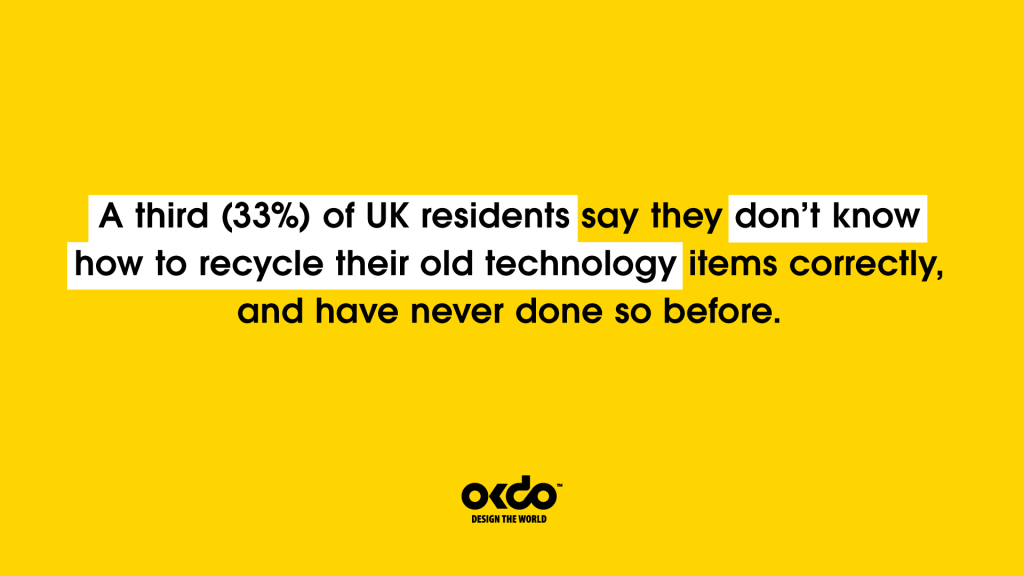
E-waste can have detrimental effects on the environment when not handled properly. The gadgets and devices we use daily are made with hundreds of materials that can contaminate earth and water if not disposed of correctly.
The UK is one of the largest producers of e-waste in the world – with 23.9kg of e-waste on average produced per head, according to the Environmental Audit Committee’s Electronic Waste and the Circular Economy report.
Our recent research into e-waste in the UK found that Brits hoard up to 60 items of old, unused tech per household – stashing away old cables, laptops, and smartphones.
With so many people reporting that they’re unsure how to recycle or safely dispose of their old tech, e-waste fly-tipping has become a big issue across many areas of the country.
Let’s discover some more stats regarding e-waste in England.
Liverpool is England’s e-waste capital
We analysed historical DEFRA (Department for Environment, Food and Rural Affairs) data on fly-tipping involving e-waste across 325 locations in England to find out which areas have seen the highest numbers of incidents.
Across the past five years, Liverpool has reported 9,992 fly-tipping incidents involving electronic items, making it in the e-waste fly-tipping capital in England.
According to national fly-tipping statistics by DEFRA, there were on average 17 fly-tipping incidents per 1,000 people in England last year. Most fly-tipping incidents involve household waste (65%), and around 15% of all fly-tipping incidents include electrical waste.

Last year, 13,400 fixed penalty notices were issued specifically for small scale fly-tipping, 28,000 concerning littering, and 2,500 in relation to the household duty of care. There were also 43,000 warning letters issued.
Our survey into how well-informed the public is on recycling old tech revealed a correlation between the areas where e-waste fly-tipping incidents are the highest. It also highlights the areas where most residents reported a lack of knowledge around the safe disposal of their old technology items.
In Liverpool, two in five (40%) said they were not aware of ways to safely get rid of old tech.
In Manchester, the second most affected area with 9,667 incidents across the past five years, 33% of residents revealed they don’t know how to recycle their old tech.
Other highly affected cities such as Birmingham, Leeds, and London reported similar statistics, with 34%, 31%, and 29% of residents in the dark about responsible disposal of unused tech items.


Top 10 areas with the highest number of reported e-waste fly-tipping incidents in the past five years
- Liverpool (9,992 incidents)
- Manchester (9,677)
- Haringey, London (8,536)
- Bradford (8,816)
- Plymouth (7,993)
- Leeds (7,981)
- Birmingham (6,972)
- Southampton (6,340)
- Ealing, London (5,971)
- Enfield, London (5,096)
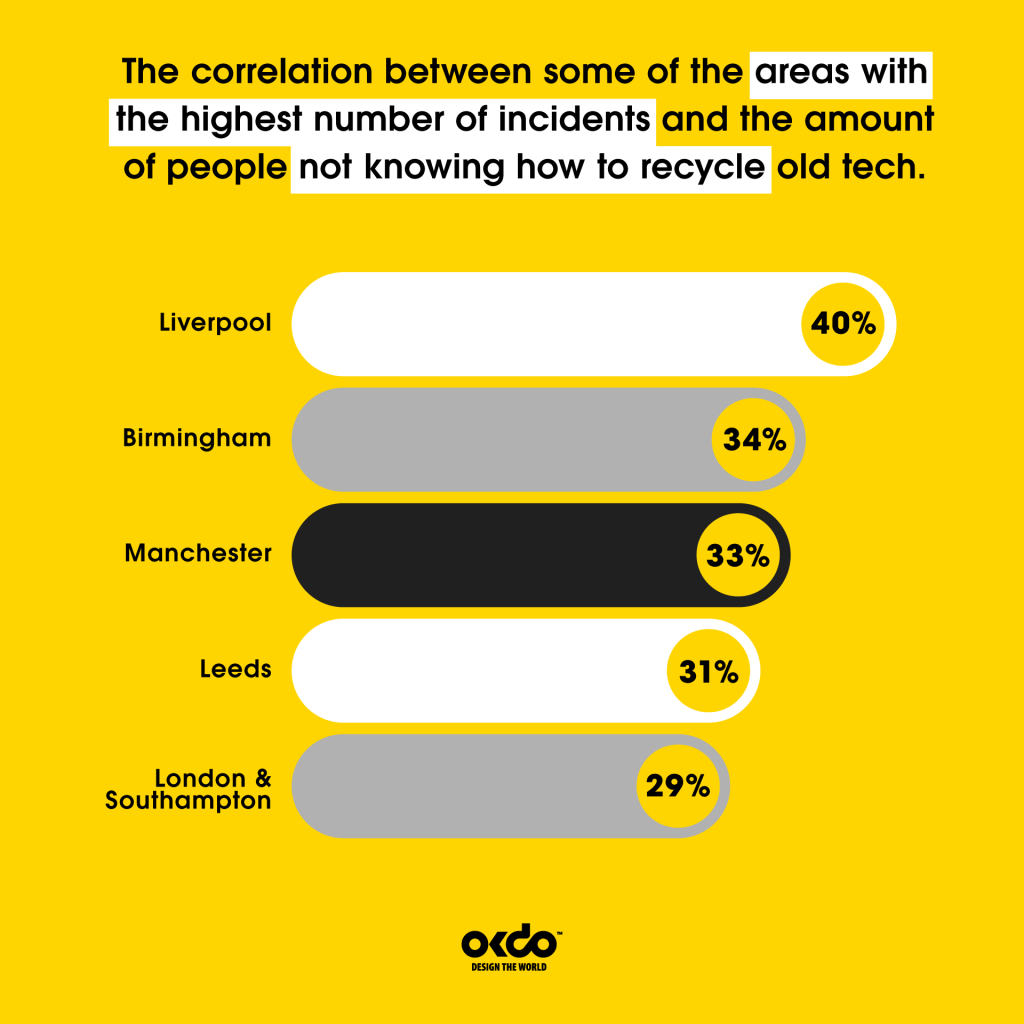
E-waste fly-tipping is becoming more common
Our analysis of the DEFRA data also showed that some areas of England are seeing worrying rises in e-waste being disposed of illegally. Kirklees in West Yorkshire saw the highest growth in reported fly-tipping incidents involving electronic items. In the past five years, reported incidents have increased by +6,124%, considerably more than anywhere else in the country.
Tower Hamlets, London saw the next biggest rise in incident numbers at +1,097%, while e-waste fly-tipping has increased by +420% in Surrey Heath.

Areas that have seen the biggest increase in the number of reported e-waste fly-tipping in the past five years
- Kirklees (+6,124%)
- Tower Hamlets, London (+1,097%)
- Surrey Heath (+420%)
- Hammersmith and Fulham (+403%)
- East Hertfordshire (+335%)
- South Staffordshire (+331%)
- Harlow (+321%)
- Uttlesford (+300%)
- Warrington (+292%)
- Lambeth (+291%)
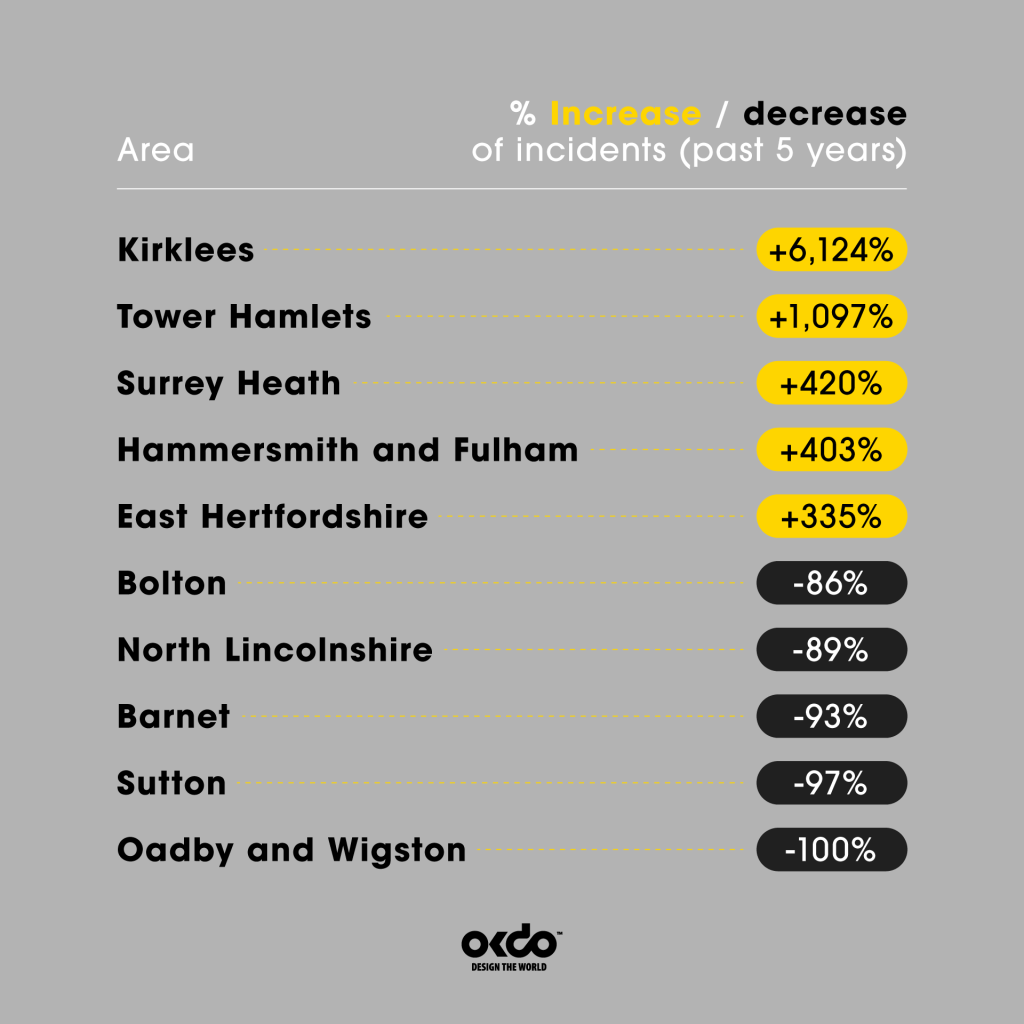
However, some areas have seen instances of illegal e-waste dumping decrease in the same five-year period, showing that some progress is being made. Barnet (-93%), Sutton (-97%) and Oadby and Wigston (-100%) have seen the best improvements over the last half-decade.
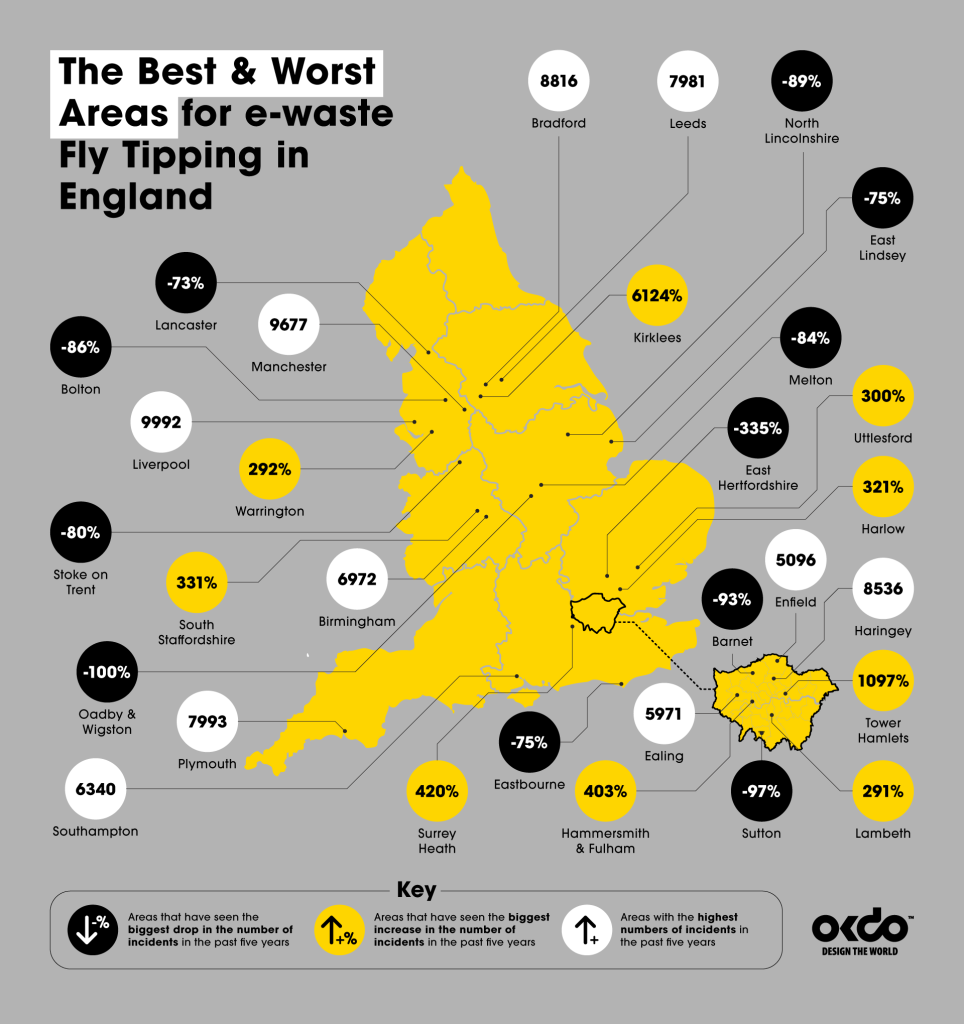
2021 Fly-tipping Data Update in the UK
Our original research into the extent of e-waste fly-tipping across England looked at data from the Department for Environment, Food and Rural Affairs which covered reported incidents across 325 locations through to the end of 2020. We decided to refresh our report adding in data released for 2021 to see how the situation has changed in the last year.
Liverpool still tops the list as the city most affected by e-waste fly-tipping, with 11,328 reported incidents in the past five years. Manchester (10,756 incidents) and Haringey in London (9,593 incidents) still occupy second and third place.
When looking at year-on-year comparisons, the data shows that Reigate and Banstead, Surrey saw the biggest increase in e-waste fly-tipping compared with 2020, with reported incidents there rising by 1,490%.
Solihull in the West Midlands (+819%) and South Holland in Lincolnshire (+354%) followed as the areas with the next largest year-on-year increases.

Areas that have seen the biggest increase in the number of reported e-waste fly-tipping incidents year-on-year:
- Reigate and Banstead, Surrey (+1,490%)
- Solihull, West Midlands (+819%)
- South Holland, Lincolnshire (+354%)
- Barnet, London (+276%)
- Haringey, London (+238%)
- Vale of White Horse, Oxfordshire (+237%)
- Cheltenham, Gloucestershire (+236%)
- High Peak, Derbyshire (+235%)
- Kingston upon Hull, East Yorkshire (+232%)
- Huntingdonshire (+220%)
However, progress is being made elsewhere – particularly in Enfield, London, which was one of the areas with the highest number of reported incidents in our original study. In 2021, Enfield saw the biggest year-on-year decrease (-51%), with other notable decreases in East Devon (-31%) and Doncaster in South Yorkshire (-26%).
Across the nation, fly-tipping is a growing problem. According to new national fly-tipping statistics by DEFRA, local authorities in England saw a +16% increase in reported fly-tipping incidents in the last year, with the number of occurrences reported in 2020/21 rising to 1.13 million versus 980,000 in 2019/20.
As in the previous year, just under two thirds (65%) of fly-tips involved household waste. The number of fixed penalty notices issued was 57,600 in 2020/21, with the total value of fines issued reaching £440,000.

Richard Curtin, SVP of Technology at OKdo, commented on the findings:

“Our research has shown there’s still much to be done about raising awareness on the environmental impact of e-waste across the nation. As a business and part of the wider Electrocomponents group, we are committed to making responsible choices whilst supporting rapid development. It’s our priority to make sure our customers can trust us to be conscious about our impact and take tangible steps to reduce it.
The data suggests there is a correlation between the areas with the highest number of e-waste fly-tipping incidents and the number of people who are in the dark about ways to recycle their old technology safely and responsibly. This highlights the need for education on the matter nationwide to help the public fully grasp the impact electronic waste can have on the environment if not disposed of correctly.”
– Richard Curtin, SVP of Technology at OKdo

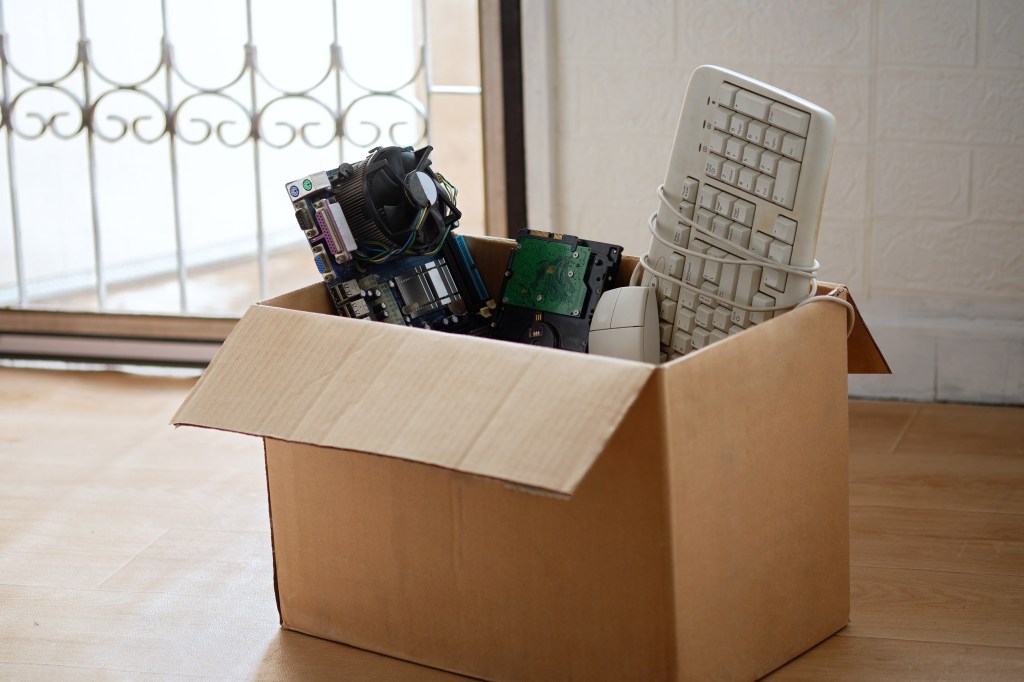

“Here at OKdo, we are taking steps to promote electronic waste recycling and reduce our environmental impact. One of our initiatives is our Raspberry Pi recycling scheme, OKdo Renew, in partnership with Raspberry PI and the Sony Technology centre. By offering this service, which provides a £10 voucher for every recycled working Raspberry Pi board, we’re hoping to encourage the public to think of ways technology can impact the environment and give them incentives to recycle and give their old tech a new life.
For each one we renew, we will also be making a donation to the Raspberry Pi Foundation, which works to put the power of computing into the hands of young people all over the world, and encourages them to express themselves creatively”, concluded Richard Curtin, SVP of Technology at OKdo.
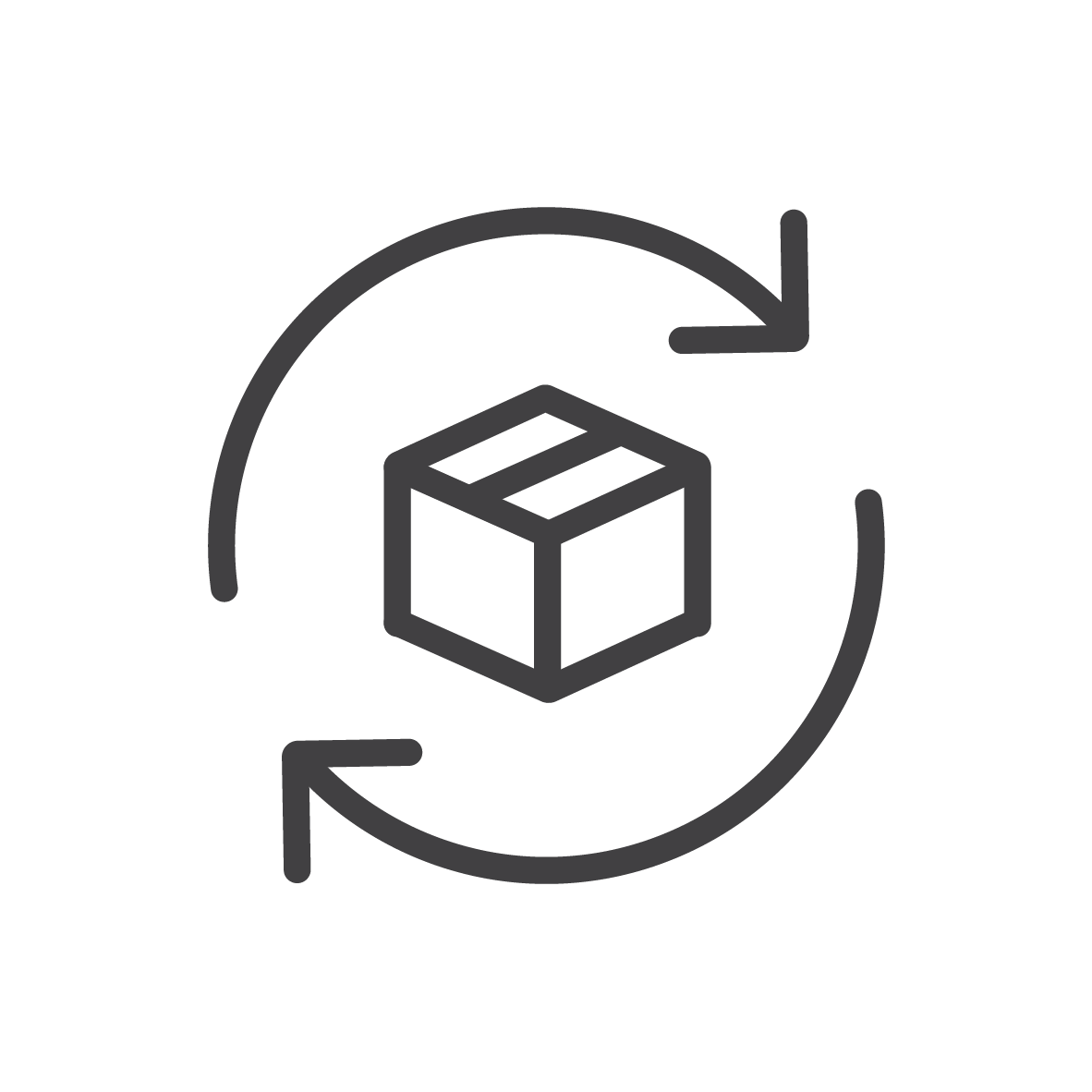
Visit our OKdo Renew page to learn more about how we are promoting electronic waste recycling, aiming to reduce our environmental impact. We’ve got an amazing deal for you! You can get a £10 voucher for use on OKdo.com when you send any model of pre-loved Raspberry Pi board to us free of charge.
Your Raspberry Pi computer will then be tested to original Raspberry Pi standards at the Sony Technology Centre where they are originally manufactured and then renewed ready for another life.


Do you want to discover more useful information on the e-waste recycling topic? Read our blog about the electronic waste crisis in the UK. Find out tips that will help you recycle old electronics that you no longer use.
The E-waste Crisis in the UK and How to Recycle: An Infographic

Sources and Methodology:
- Data from a survey of 2,000 UK residents conducted in October 2021
- Data on average e-waste production per head: Electronic waste and the circular economy by the Environmental Audit Committee
- DEFRA data on Fly-tipping incidents and actions reported by local authorities 2012-13 to 2019-20 sourced from: https://www.gov.uk/government/statistics/fly-tipping-in-england
- Full data analysis available upon request

